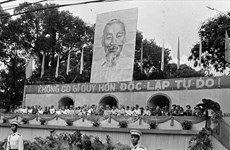Thailand: urban farm model improves livelihoods of poor people amid COVID-19
Food security has become more urgent in Thailand as the COVID-19 pandemic has pushed more people into poverty and a new urban farm model seems to be a good solution to this issue.
Hanoi (VNA) – Food security has become more
urgent in Thailand as the COVID-19 pandemic has pushed more people into poverty
and a new urban farm model seems to be a good solution to this issue.
An urban farm developed on a former landfill site in northern Thailand is not only improving food security and livelihoods of poor families during the pandemic, but also expected to be a model for unused spaces in other cities.
The farm in Chiang Mai, about 700 km from Bangkok, took shape during Thailand’s nationwide lockdown to curb the spread of the COVID-19 last year, when many of the city’s residents lost their tourism-dependent jobs.
Supawut Boonmahathanakorn, the man behind the idea, is a community architect who works on housing solutions for Chiang Mai’s homeless and informal settlers.
He approached authorities with a plan to convert the unused landfill into an urban farm to support the poor. Shortly after he received approval, an appeal was launched on social media which resulted in donations of plants, seedlings and manure from residents, according to him.
With diggers loaned by the city, Supawut and his team cleared some 5,700 tonnes of rubbish on the 4,800 sqm plot that lies next to a canal and a cemetery.
The farm opened to the community in June, and now about half a dozen homeless families, students from a public school and members of the public grow eggplant, corn, bananas, cassava, chilli, tomatoes, kale and herbs there, Supawut said.
Urban farms cannot feed an entire city, but they can improve nutrition and build greater self-sufficiency especially among vulnerable people during a pandemic, he added.
Urban agriculture can potentially produce as much as 180 million tonnes of food a year - or about 10 percent of the global output of pulses and vegetables, according to a 2018 study led by Arizona State University.
Rooftop farms, vertical gardens and allotments also help increase vegetation cover, which is key to limiting rising temperatures and lowering the risk of flooding in cities.
While land in cities is scarce and expensive, rooftops and spaces below expressways and viaducts can be repurposed, said landscape architect Kotchakorn Voraakhom, who designed Asia’s largest urban rooftop farm in Bangkok./.
An urban farm developed on a former landfill site in northern Thailand is not only improving food security and livelihoods of poor families during the pandemic, but also expected to be a model for unused spaces in other cities.
The farm in Chiang Mai, about 700 km from Bangkok, took shape during Thailand’s nationwide lockdown to curb the spread of the COVID-19 last year, when many of the city’s residents lost their tourism-dependent jobs.
Supawut Boonmahathanakorn, the man behind the idea, is a community architect who works on housing solutions for Chiang Mai’s homeless and informal settlers.
He approached authorities with a plan to convert the unused landfill into an urban farm to support the poor. Shortly after he received approval, an appeal was launched on social media which resulted in donations of plants, seedlings and manure from residents, according to him.
With diggers loaned by the city, Supawut and his team cleared some 5,700 tonnes of rubbish on the 4,800 sqm plot that lies next to a canal and a cemetery.
The farm opened to the community in June, and now about half a dozen homeless families, students from a public school and members of the public grow eggplant, corn, bananas, cassava, chilli, tomatoes, kale and herbs there, Supawut said.
Urban farms cannot feed an entire city, but they can improve nutrition and build greater self-sufficiency especially among vulnerable people during a pandemic, he added.
Urban agriculture can potentially produce as much as 180 million tonnes of food a year - or about 10 percent of the global output of pulses and vegetables, according to a 2018 study led by Arizona State University.
Rooftop farms, vertical gardens and allotments also help increase vegetation cover, which is key to limiting rising temperatures and lowering the risk of flooding in cities.
While land in cities is scarce and expensive, rooftops and spaces below expressways and viaducts can be repurposed, said landscape architect Kotchakorn Voraakhom, who designed Asia’s largest urban rooftop farm in Bangkok./.












